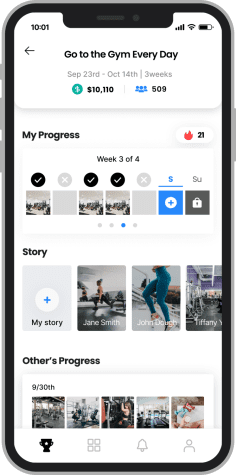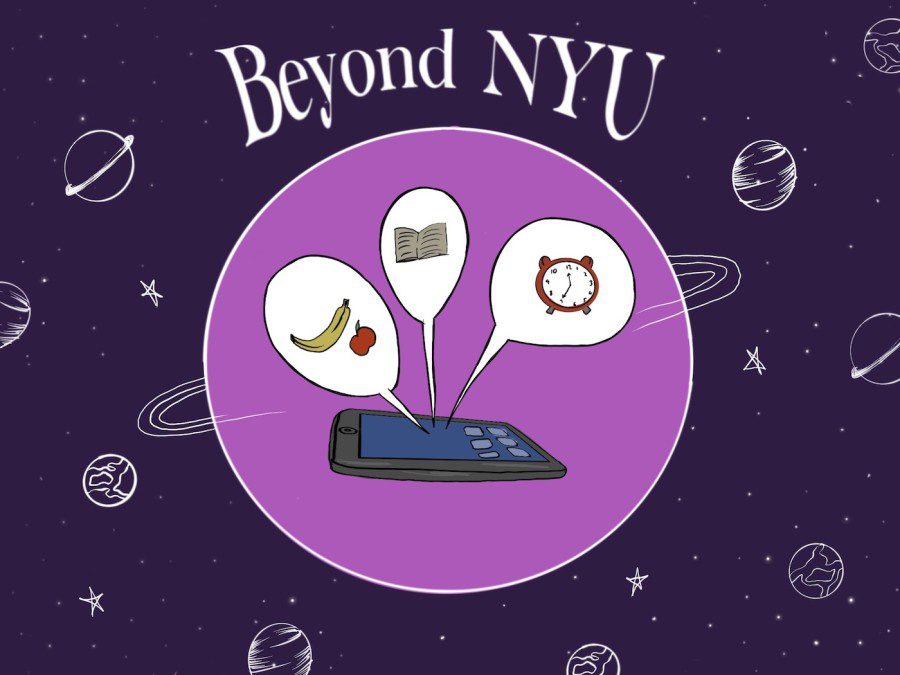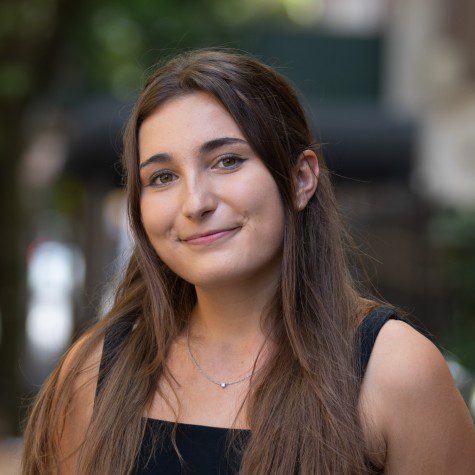Beyond NYU: Betting on building healthy habits
Each week, WSN sits down with an NYU student, faculty member or alum who’s making change beyond NYU. CAS senior Tiffany Lee shares how a habit-building app — developed alongside a Tandon graduate student and an NYU Abu Dhabi alum — allows users to bet on their own success.
The app 021 measures a user’s ability to follow through on tasks by tracking fitness, nutrition and diet, lifestyle, skills and learning and mindfulness. (Illustration by Aaliya Luthra)
September 16, 2022
Tiffany Lee, a CAS senior, used to be a chronic procrastinator. She tried YouTube videos, self help books, podcasts and apps to tackle her time management problem, but nothing seemed to stick. So, alongside Tandon graduate student Neil Araujo and NYU Abu Dhabi alum Branden Kang, Lee decided to place a bet on her habit-building success.
The team created 021, an app that targets building healthy habits across five categories: fitness, nutrition and diet, lifestyle, skills and learning, and mindfulness. The app allows users to pay into specific challenges and bet on their ability to follow through. Users who complete 85% or more of their selected tasks — tracked by submitting photos taken with an in-app camera — receive all of their money back, and those who complete 100% are eligible for additional rewards.
In an interview with WSN, Lee discussed why building habits is especially important for college students, explained how the features of 021 allow for accountability and consistency, and previewed the app’s design.
This interview has been edited for length and clarity.
WSN: What is the main goal of 021, and how were you able to narrow down its focus during the development process?
Lee: We first had to meet with a lot of potential customers to see what the real problem was and what would be the best solution. What I learned in my courses is that a lot of co-founders only focus on their own thoughts, and they think, “Oh, this is what people need.” But then after they launch, they find out that that’s actually not what people needed. We really wanted to find that niche of what people need. In the end, we found out that for a lot of people, the key is that they lack consistency — that they need a push from external resources so that they can constantly feel motivated. That’s why we’re focusing on providing features that promote consistency.

Lee first came up with the idea behind 021 while she was taking an entrepreneurship class at NYU. She worked alongside Araujo and Kang shortly after, and the three brought the proposal to Leslie eLab, NYU’s collaborative facility for budding entrepreneurs, where they participated in an accelerator boot camp. Lee said that she is also taking a startup-based class this semester taught by Cynthia Franklin, the director of entrepreneurship for the W. R. Berkley Innovation Labs at NYU’s Stern School of Business, who has been supportive of the project and has helped the team spread the word about the upcoming launch.
Lee added that her teammates share the goal of reducing procrastination and improving time management — issues that they have experienced during their time as students. She said that they have taken advantage of many services that NYU offers through its entrepreneurship and business programs.
WSN: Tell me more about your team. What has it been like to work with them?
Lee: Meeting those two teammates has been the best part because having people that share a similar vision is really essential. Because it’s a startup, we’re always busy and it’s a very exhausting process. We don’t really sleep — we work until two or three in the morning and pull all nighters, but even when I think I could be burnt out, they constantly give me energy. We’re positively influencing each other and it’s a really lucky thing for me that I met them.
Before users bet on a challenge, they are able to see the total amount of money that has been pooled by other participants and choose how much to put in. Only the users who complete less than 50% of the challenge they signed up for will not have their money refunded, and those who complete between 50% and 85% will receive a partial refund. The money lost by other users will be rewarded to the challenge’s top performers.
The app tracks accountability by requiring a photo, which must be taken according to specific guidelines and uploaded to the app for each milestone of a challenge. According to Lee, the team is currently developing AI technology that will sort through the photos. However, for the beta version, they will be approving photos themselves.
021 also features a community feed that allows users to share their progress with fellow participants. They will be able to share short videos to the feed, which others can like and comment on. Lee said that this feature exemplifies the team’s goal of promoting not only individual growth, but also growth of the community as a whole.
WSN: How do 021’s social media features contribute to the promotion of healthy habit-building?
Lee: We wanted to build a healthy and positive community. If we see failures and successes and that other people are in this together, then we can grow together. That’s why we utilize social media features that allow people to upload short video content. It could be a motivational message. It could be like “Today I failed, but tomorrow, I’m going to do better.” It could be something like that or positive affirmations or a story of them succeeding.
The team is in the process of registering 021 with the Apple App Store and spreading the word among students at NYU and other New York schools. The app’s official launch is scheduled for January 2023, but beta testing will begin on Monday, Sept. 19. Those interested in participating can fill out a short form on the app’s landing page. Challenges during the beta testing phases of the app will use a free, digital currency rather than real money, but participants will still be eligible for physical rewards.
WSN: What is your vision for the future of 021?
Lee: A lot of students use different services in the market for habit building, but the market is very habit tracking-centered. It only offers services that provide features for people who are already prepared to get going. 021 is for early habit builders who don’t really know where to start, who don’t really see the clear need of habit building. Usually people download different apps, try them for a free trial period and then they move on to the next because they find it very inefficient, and they end up not committing. We want our app to make people finally commit to habit building — we want this app to be the last habit-related app that they download.
If you know an NYU student, faculty member or alum who’s making change beyond NYU, contact [email protected].
Contact Abby Wilson at [email protected].




























































































































































